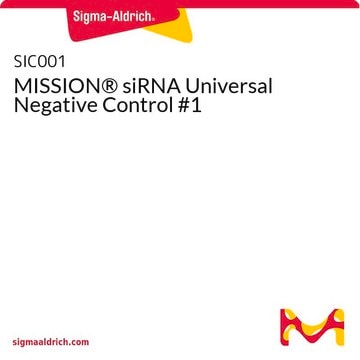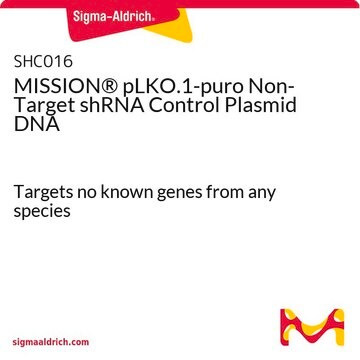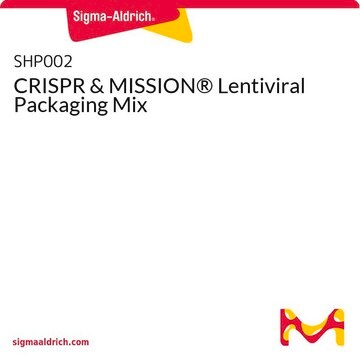ORFBFPV
MISSION® TRC3 ORF BFP Lentivirus Control
Bejelentkezésa Szervezeti és Szerződéses árazás megtekintéséhez
Összes fotó(1)
About This Item
UNSPSC kód:
41106609
NACRES:
NA.51
Javasolt termékek
kiszerelés
vial of 200 μL
Minőségi szint
koncentráció
1x106 VP/ml (via p24 assay)
alkalmazás(ok)
genome mapping
genomic analysis
kiszállítva
dry ice
tárolási hőmérséklet
−70°C
Related Categories
Általános leírás
The MISSION TRC3 ORF BFP Lentivirus Control Transduction Particles contain an ORF insert expressing BFP, and is useful as a positive (or negative control) in experiments using the MISSION TRC3 LentiORF Library Collection in arrayed or pooled format, including our latest Whole Genome LentiORF Pool.
The BFP ORF control transduction particles are produced from the sequence-verified lentiviral plasmid, pLX307-puro-BFP (ORFBFP). This positive control can be used for measuring transduction efficiency and optimizing ORF delivery in cell lines that do not survive any puromycin exposure. The BFP Control contains a gene encoding BFP driven by the EF1a promoter. This control provides fast visual confirmation of successful transduction. Ampicillin and puromycin antibiotic resistance genes provide selection in bacterial or mammalian cells respectively.
Unlike murine-based MMLV or MSCV retroviral systems, lentiviral-based particles permit efficient infection and integration of the construct into differentiated and non-dividing cells, such as neurons and dendritic cells, overcoming low transfection and integration difficulties when using these cell lines. Self-inactivating replication incompetent viral particles are produced in packaging cells (HEK293T) by co-transfection with compatible packaging plasmids.
In addition, the Control Transduction Particles are pseudotyped with an envelope G glycoprotein from Vesicular Stomatitis Virus (VSV-G), allowing transduction of a wide variety of mammalian cells. 200 μl of 106 TU/ml (via p24 titering assay) lentiviral particles are provided as frozen stock.
When conducting experiments using MISSION TRC3 ORF clones, the proper controls should be a key element of your experimental design to allow for accurate interpretation of gene and protein expression results. The MISSION Control Transduction Particles are a critical positive control to monitor transduction efficiency.
To see more application data, protocols, vector maps visit the TRC3 Information Page
The BFP ORF control transduction particles are produced from the sequence-verified lentiviral plasmid, pLX307-puro-BFP (ORFBFP). This positive control can be used for measuring transduction efficiency and optimizing ORF delivery in cell lines that do not survive any puromycin exposure. The BFP Control contains a gene encoding BFP driven by the EF1a promoter. This control provides fast visual confirmation of successful transduction. Ampicillin and puromycin antibiotic resistance genes provide selection in bacterial or mammalian cells respectively.
Unlike murine-based MMLV or MSCV retroviral systems, lentiviral-based particles permit efficient infection and integration of the construct into differentiated and non-dividing cells, such as neurons and dendritic cells, overcoming low transfection and integration difficulties when using these cell lines. Self-inactivating replication incompetent viral particles are produced in packaging cells (HEK293T) by co-transfection with compatible packaging plasmids.
In addition, the Control Transduction Particles are pseudotyped with an envelope G glycoprotein from Vesicular Stomatitis Virus (VSV-G), allowing transduction of a wide variety of mammalian cells. 200 μl of 106 TU/ml (via p24 titering assay) lentiviral particles are provided as frozen stock.
When conducting experiments using MISSION TRC3 ORF clones, the proper controls should be a key element of your experimental design to allow for accurate interpretation of gene and protein expression results. The MISSION Control Transduction Particles are a critical positive control to monitor transduction efficiency.
To see more application data, protocols, vector maps visit the TRC3 Information Page
Alkalmazás
Functional Genomics/Overexpression Screening/Target Validation
Elkészítési megjegyzés
Puro Kill Curve and Determining CFU (Colony Formation Unit) per mL. Prior to performing a library-scale screening, two preliminary experiments must be conducted. Visit the Lentiviralpool Information Page or refer to the technical bulletin.
Jogi információk
Use of this product is subject to one or more license agreements. For details, please see the MISSION License Page
MISSION is a registered trademark of Merck KGaA, Darmstadt, Germany
kapcsolódó termék
Product No.
Leírás
Árazás
Tárolási osztály kódja
12 - Non Combustible Liquids
WGK
WGK 3
Lobbanási pont (F)
Not applicable
Lobbanási pont (C)
Not applicable
Válasszon a legfrissebb verziók közül:
Analitikai tanúsítványok (COA)
Lot/Batch Number
Nem találja a megfelelő verziót?
Ha egy adott verzióra van szüksége, a tétel- vagy cikkszám alapján rákereshet egy adott tanúsítványra.
Már rendelkezik ezzel a termékkel?
Az Ön által nemrégiben megvásárolt termékekre vonatkozó dokumentumokat a Dokumentumtárban találja.
Tudóscsoportunk valamennyi kutatási területen rendelkezik tapasztalattal, beleértve az élettudományt, az anyagtudományt, a kémiai szintézist, a kromatográfiát, az analitikát és még sok más területet.
Lépjen kapcsolatba a szaktanácsadással








